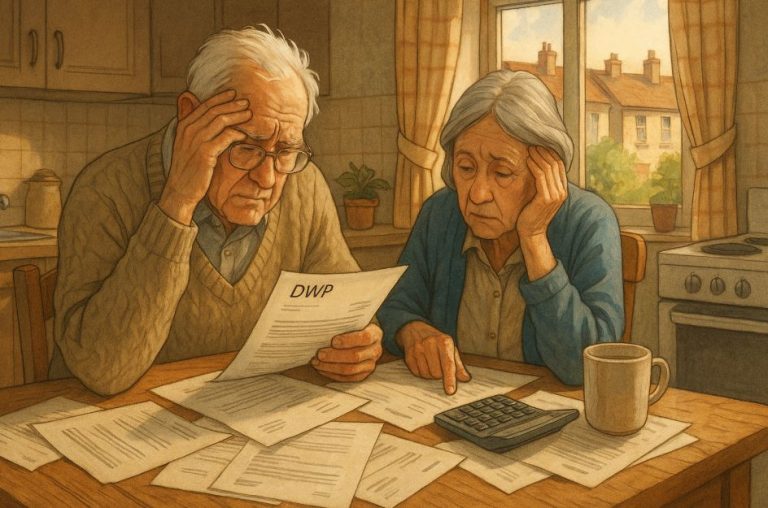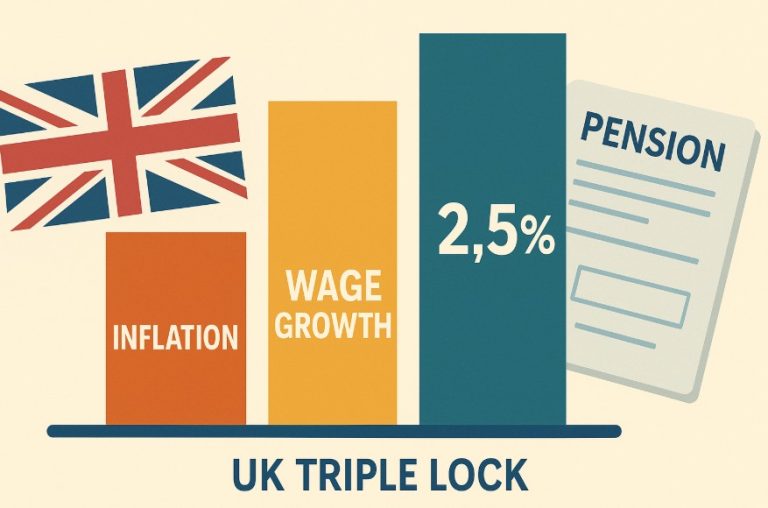The UK pension system is undergoing notable changes, yet more than half of British adults remain unaware of these policy shifts that could significantly impact their retirement planning.
From age increases to tax reforms, understanding these developments is vital for financial preparedness.
As the government implements new timelines and tax structures, individuals must adapt to maintain retirement security.
What Are the Upcoming UK State Pension Age Changes?

The state pension age in the United Kingdom is set to increase over the coming decades. As of now, the pension age stands at 66 for both men and women. However, the government has already legislated for two key age changes:
- Between 2026 and 2028, the state pension age will rise from 66 to 67.
- Between 2044 and 2046, the pension age will increase from 67 to 68.
These increases are part of a broader government strategy to align the retirement system with longer life expectancy and ensure the long-term sustainability of the UK pension model.
The pension age is not fixed permanently; instead, it undergoes a statutory review every six years.
The most recent review considered demographic data, economic factors, and the affordability of pensions for future generations.
People approaching retirement need to be aware of their revised state pension age. Failure to do so could result in significant shortfalls in income planning.
This age increase may also affect when people choose to exit the workforce or downsize their careers.
The rising pension age also brings a knock-on effect for workplace and private pensions. Many pension providers align access ages with the state pension, potentially delaying when funds can be drawn without penalties.
Why Are So Many UK Adults Unaware of These Retirement Changes?
Despite the significant implications of the upcoming retirement and pension reforms, a surprisingly large portion of the UK population remains unaware of them.
According to a survey by Schroders Personal Wealth, more than 51% of UK adults stated they were “not aware at all” of key changes, including the rising state pension age, changes to pension inheritance rules, and delayed access to tax-free pension lump sums.
This widespread lack of awareness highlights a concerning disconnect between policy announcements and public understanding.
There are several contributing factors behind this information gap.
1. Complexity of Pension Policies
Pension regulations are often written in legal or technical language, which makes them difficult for the average person to interpret.
The rules can vary depending on whether one has a defined benefit or defined contribution pension, whether they are self-employed or employed, and whether they’ve accrued National Insurance credits. This complexity can lead to confusion and disinterest, especially for those who are not nearing retirement age.
2. Delayed Engagement witJh Retirement Planning
Many people do not begin actively thinking about retirement until they are in their 50s or even 60s. Younger workers, in particular, tend to prioritise immediate financial needs such as housing, childcare, or repaying student loans, leaving pensions as an afterthought. As a result, changes implemented years in advance often go unnoticed by the very people they will affect most.
3. Limited Public Communication and Awareness Campaigns
While the government is legally required to review and publicise state pension age changes, the actual communication efforts are often limited to official websites or formal reports.
These announcements do not always reach the wider population. Without broad, targeted campaigns across traditional media, social platforms, and employer communications, many individuals simply remain unaware.
4. Misconceptions About Eligibility and Entitlement
Surveys have shown that many people hold incorrect assumptions about how the state pension works. For example, a study by Charles Stanley found that many adults believed 24 years of National Insurance contributions were enough to qualify for the full pension, when in fact, 35 years are required. Such misconceptions fuel a false sense of security and reduce the urgency to seek accurate information.
5. Changing Retirement Norms and Expectations
The traditional model of retiring at a fixed age with a guaranteed pension is fading. Today’s retirement planning often involves multiple income streams, private pensions, investments, and phased retirements.
In this new environment, people may not know how or when government changes apply to them specifically, especially as timelines shift over decades.
To bridge this awareness gap, experts recommend a combination of proactive government campaigns, employer-led education, and more user-friendly pension tools.
Financial advisers also play a key role in helping individuals understand how upcoming changes impact their unique circumstances.
How Will the Retirement Age Changes Impact Your Financial Planning?

Raising the pension age by even one or two years has significant implications for individual financial planning. Those who anticipated retiring at 66 may now need to support themselves for an additional year or two without relying on the state pension.
Impacts include:
- An extended period of work or the need to delay retirement.
- Increased reliance on private savings or occupational pensions.
- A shorter period of state-backed retirement income.
People who have physically demanding jobs or health issues may struggle to continue working into their late sixties. Without adequate savings or employer pensions, these individuals face financial vulnerability during the transition years.
Financial planning strategies must now factor in a delayed retirement timeline, along with a longer life expectancy. Retirement budgets, housing decisions, and insurance planning should be reassessed in light of these shifts.
Here’s a comparative view of how pension age changes affect planning timelines:
| Pension Age | Retirement Planning Milestone | Required Savings (Est.) |
| 66 (Current) | Budget for 20-25 years post-retirement | £200,000 – £250,000 |
| 67 (2026-2028) | Extend savings for 1 extra year | Additional £10,000 – £12,000 |
| 68 (2044-2046) | Longer work life, reduced pension years | Delayed income start |
Delays in receiving the state pension also affect eligibility for related benefits, including pension credit, free bus travel, and winter fuel payments.
What Are the New Pension Inheritance Tax Rules Coming in 2027?
The government is implementing significant changes to how pensions are treated for inheritance tax purposes. Starting in April 2027, defined contribution pensions will be included in an individual’s taxable estate when passed to beneficiaries, except when left to a spouse or civil partner.
Previously, pensions offered a tax-efficient way to pass on wealth, often free of inheritance tax. Under the new rules:
- Pension pots passed to non-spouse beneficiaries will be subject to inheritance tax at 40% for estates exceeding the £325,000 threshold.
- Beneficiaries may also have to pay income tax if the pension holder dies after the age of 75.
- Combined, this could result in a total effective tax rate of up to 67% for some recipients.
This shift has wide-reaching implications for retirement and estate planning. Many individuals have used pensions as part of their inheritance strategy, particularly because pension funds are not part of the probate process. The new regulations undermine this advantage.
Key highlights of the rule changes:
| Pension Inheritance Tax Change | Before 2027 | After April 2027 |
| Inheritance tax on pensions | Often exempt | Included in estate |
| Spouse or civil partner exemption | Yes | Yes |
| Taxable for other beneficiaries | Rarely | Common |
| Effective tax rate for high earners | 0% – 45% | Up to 67% |
People with large pension pots, or those intending to pass wealth to children or grandchildren, may need to consult with financial advisers and explore alternatives such as trusts or lifetime gifts.
When Can You Access Your Tax-Free Pension Lump Sum From 2028?

Another key policy change will affect when people can access their pension tax-free lump sum. Currently, individuals can access up to 25% of their pension pot without tax at age 55. From April 2028, this access age will rise to 57.
This change applies to:
- Personal pensions, including SIPPs
- Workplace defined contribution schemes
- Some occupational pension plans
People born after 5 April 1973 will be affected, and the shift means two additional years of waiting before accessing pension savings without penalty.
Those planning to retire early or rely on that lump sum to repay debts, fund property purchases, or make lifestyle changes will need to adjust their financial plans accordingly.
Key implications:
- A need for increased short-term savings for bridging the two-year gap
- Revised financial goals and timelines for retirement
- Higher reliance on employer or personal investments during the waiting period
Some pension schemes may allow access earlier if individuals meet certain conditions or have a protected pension age. However, this is not universal and must be confirmed directly with pension providers.
How Much Do You Need to Qualify for the Full UK State Pension?

Understanding how to qualify for the full state pension is crucial for retirement planning. Many people incorrectly believe they need only 24 years of contributions or credits. In fact, the full state pension requires 35 qualifying years of National Insurance (NI) contributions or credits.
To receive any state pension, a minimum of 10 years is required. These years do not have to be consecutive, and credits may be granted in certain circumstances, such as for those receiving child benefit or caring for a family member.
The full weekly amount for the state pension in the 2024–25 tax year is £230.25, equivalent to £11,973 annually. The amount received depends on:
- Total qualifying years
- NI contribution history
- Gaps in employment or self-employment
Individuals can check their National Insurance record and forecast their pension using the online tools provided by the government. If shortfalls are identified, voluntary NI contributions can be made to fill the gap, though there are rules around eligibility and time limits.
Conclusion
Understanding the UK state pension age retirement changes is essential for effective financial planning.
With rising eligibility ages, new inheritance tax rules, and shifting access timelines, individuals must stay informed to protect their future income.
These reforms affect not only when people can retire but also how they pass on wealth. Proactive planning, regular pension reviews, and professional advice can help UK citizens navigate these changes and secure a stable, well-prepared retirement in an evolving financial landscape.
FAQs About UK State Pension Age Retirement Changes
What happens if I reach retirement age but haven’t paid enough National Insurance?
You may receive a reduced state pension, or in some cases, no state pension at all. You can often buy back missing years.
Will workplace pensions also be affected by the inheritance tax changes?
Yes, most defined contribution pensions will now fall within the taxable estate unless transferred to a spouse or civil partner.
Can I still retire before state pension age?
Yes, but you’ll need sufficient personal savings or private pension funds to cover the gap until state pension eligibility.
How do I find out my exact pension age?
Use the official UK Government’s State Pension Age calculator online. Your date of birth determines your eligibility date.
What’s the difference between state pension and private pension changes?
The state pension is managed by the government, while private pensions are affected by separate access age changes and investment rules.
Are younger workers more affected by the pension reforms?
Yes, especially those born after April 1973, who face delayed access to pensions and new inheritance tax rules.
How can I plan for the 2028 pension access age change?
Speak with a financial adviser, update your retirement timeline, and adjust your saving strategy to account for the later access age.






